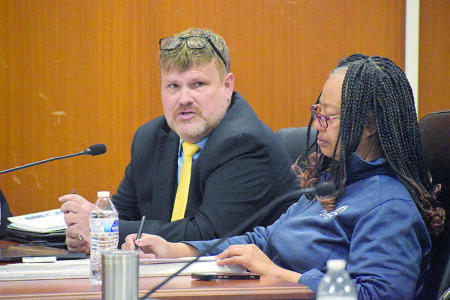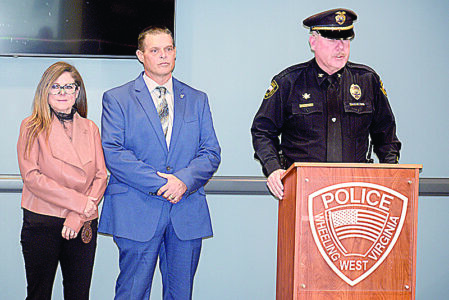Funding for Homeless Shelter Beds Sparks Lengthy Discussion

Photo by Eric Ayres Wheeling City Council members Ben Seidler and Connie Cain attend a meeting Tuesday night, when after a lengthy discussion about the city’s homeless population, council members agreed to provide funding to help The Life Hub open 30 additional beds in The Salvation Army’s shelter facility in East Wheeling.
WHEELING — Members of Wheeling City Council on Tuesday night unanimously voted to help fund a joint venture between The Life Hub and the Salvation Army of Wheeling that promises to create 30 more beds for homeless individuals over the next six months.
The action, however, did not come without stipulations about progress that city leaders want to see being made toward helping people in need find permanent housing. While an amended ordinance to provide $75,000 in opioid settlement funds was approved, the vote came following a lengthy discussion about the city’s homeless population.
With the closure of the city’s only exempted homeless encampment looming on Dec. 1, the new ordinance introduced during Tuesday night’s council meeting provided half of the $150,000 The Life Hub would need to open 30 beds at The Salvation Army of Wheeling’s facility on 16th Street in East Wheeling. Officials at The Life Hub are working to come up with the other half of the needed funds. This would create a new women’s-only shelter at this location to supplement The Life Hub’s 54 shelter beds at the former First English Lutheran Church building on 16th Street downtown.
While some on Tuesday night said the city leaders’ willingness to help fund these additional shelter beds was a step in the right direction, Wheeling City Councilman Ben Seidler delivered a lengthy and stern speech before the matter came to the floor for a vote and for further discussion. Seidler asserted that simply funding more jobs for shelter employees and providing nighttime beds for homeless individuals is not solving the problem.
“I feel like that’s a pretty unproductive, fiscally irresponsible use of that money,” Seidler said. “For $150,000, we’re not buying housing, we’re not building housing and we’re not ending homelessness. We’re paying people to babysit a temporary shelter for six months until the money runs out. The painful truth is, we’ve been here before.”
Two years ago after the city approved its camping ban, the exempted site was authorized in order to give homeless individuals a place to go. Seidler said this site was supposed to be a temporary triage site where service providers could reach homeless individuals, help them get resources they need and help start them on a path out of homelessness.
The camp has only continued to grow since then, with the latest figures lingering around 70 homeless individuals living there. Last month, a majority of city council members voted to recommend the camp’s closure on Dec. 1, and Mayor Denny Magruder described the exempted homeless encampment as a “failure” not only for its residents but also for the neighboring citizens and business owners.
“That camp didn’t shrink, it grew,” Seidler said. “People weren’t transitioned out of homelessness. They became stuck.”
Seidler said that providing temporary shelter is basically sustaining the status quo, which he described as “not compassion – it’s daily suffering dressed up as services.
“It seems like every time we spend more money, our homelessness grows here,” Seidler said. “It’s not a theory, it’s an observable fact. Every time we fund programs like this, the number of homeless individuals in our city increases, more people arrive from different areas, nonprofits expand their payrolls, neighborhoods suffer, first responders become more overwhelmed and the quality of life in our neighborhoods declines.”
Seidler recommended that the city provide $25,000 to fund the expanded shelter capacity for eight weeks. In order to provide more funding after that period, the city would need to see measurable milestones reached by individuals living there – such as obtaining a driver’s license or Social Security number, applying for Section 8 housing or taking other steps forward toward breaking the cycle of homelessness.
“We keep taking more people in – we have to worry about what we have now,” Councilwoman Connie Cain added. “We’re willing to work with anyone, but we need to help them get back on their feet.”
Vice Mayor Jerry Sklavounakis noted that the city’s ordinance prohibiting camping on public property allows for a managed camp, but no service agency has stepped forward to spearhead that task. Skavounakis said there is only so much the city can do to help address the dilemma.
“The only thing we can do is write the rules and allocate funds in ways that we think is appropriate,” Sklavounakis said. “We’re trying our best here, and we’re open to any solutions that the service providers have. But we are not the only players in this. We need to come together as a community and offer some solutions, short-term and long-term.”
At one point, city leaders were poised to back Seidler’s proposal to only fund a fraction of the requested money for the shelter. However, The Life Hub Shelter Director Lisa Leach came forward and explained the process of taking in new individuals at the shelter.
“Everybody is required to fill out a housing application,” Leach said, noting that if they do not have their birth certificate, they are sent to partner organizations to get one, even if they were born out of the area. Leach added that she personally helps those who need a Social Security card.
“We do everything we can to get people pushed into housing,” Leach said. “That is our main goal with everybody. We’re a nighttime emergency shelter. We are not a permanent shelter. We’re not a place to live for the rest of your life. We are all about getting people into housing and making things better for them.”
Leach said the staff at The Life Hub is compassionate, is not doing it for the money and is not simply babysitting.
“They’re there because their hearts are there,” she said. “It’s very important to get people into housing, but it takes time. We go above and beyond to do whatever we can.”
The facilities use agreement that The Life Hub has with The Salvation Army is a six-month agreement with an option to renew. An eight-week allocation would not make this possible, Leach indicated. The Salvation Army had operated a high-barrier shelter for men at its 16th Street facility until earlier this year, when the organization paused its shelter operation to focus more on homelessness prevention efforts.
Officials noted that The Salvation Army’s facility is still ready for use, and Lt. John Lawrence noted Tuesday night that it should not take long for them to secure authorization to re-open the doors to the shelter under the new agreement with The Life Hub, which will provide much of the staffing and management of the new women’s shelter.
After a lengthy question and answer session with Leach, city leaders thanked her and agreed to provide the $75,000 in opioid settlement funds for the venture as long as the benchmarks are shown for individuals to find permanent housing. Council took action to hold two readings on the new ordinance and approve the legislation Tuesday night in order to get the ball rolling on getting the shelter open in time for the camp closure on Dec. 1.
Leach said there are many success stories when it comes to helping individuals find permanent housing, but the shelter has no control over the number of people who have been migrating to Wheeling.
“People are sent here from all over the place,” Leach said. “We can’t control what happens out there. Since we opened our doors Nov. 1 of last year, we’ve had 650 different individuals come.”
Some stay only one night, Leach noted.
“I’ve been down there to the shelter – she has done a remarkable job down there,” Cain said of Leach. “I’m glad that she is overseeing this. She’s at The Life Hub, and she’s helping. But there are a lot of nonprofits out here that also need to be helping out. This can’t all be on her.”
Seider said he agreed.
“There are a lot of six-figure executives out here in nonprofit organizations,” Seidler said, indicating that local agencies that provide services to homeless individuals in Wheeling need to remain focused on reducing homelessness and finding permanent solutions for the unhoused individuals who are in the city. “I’m not against allocating $75,000. I’m against writing a blanket check if progress doesn’t happen.”




